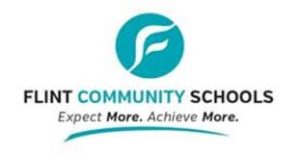By Harold Ford
Editor’s Note: East Village Magazine’s Education Beat writer, Harold C. Ford, submitted a list of 20 questions to Cassandra Washington, Flint Community Schools’ executive director of human relations. Washington responded to about half of the questions in her online reply. Her responses are provided below in a Q & A format.
Cassandra Washington, a resident of Detroit, was hired as the Flint Community Schools’ (FCS) executive director of human resources in May 2019. In her first year on the job, she helped to settle contracts with all three of the FCS employee bargaining units.
- In August 2019, the United Teachers of Flint ratified a new contract with the district by a 96 percent margin. The new pact ended a five-year pay freeze for Flint teachers.
- Paraprofessionals—members of Local 517 of Service Employees International Union (SEIU)—inked a new contract at the end of calendar year 2019. It provided SEIU members with their first pay raise in 15 years.
- At its June 10, 2020 meeting, the FCS board approved a new contract with the Congress of Flint School Administrators. Administrators had been working without a contract since June 2015. Administrators approved the contract by a 95 percent margin.

Cassandra Washington (LinkedIn Photo)
Additionally, Washington helped craft a creative response to FCS classroom teacher vacancies precipitated largely by an avalanche of resignations and retirements in 2019 and 2020. A Guest Teacher Program inserted college graduates into Flint classrooms on a full-time basis provided they sought appropriate teacher certification.
EVM: What drew you to FCS?
CW: Flint was going through a period of transformation, emerging from the water crisis, and undertaking a fundamental shift to build a new form of organization with new leadership, innovation, collaboration, and focus on community. The Finance and HR leadership positions, outsourced for years, were being brought in-house and staffed as district employees.
Moreover, the school district was being positioned as an entity of excellence in education, evolving its ability to lead again in public education. There was excitement around reimagining FCS’ advancement and much great work to do to reach those goals. I wanted to be a contributor to this work and member of the team. I have never been more excited about what are/will be able to create for our scholars – and grateful for the opportunity to do so!
EVM: Were you ever a teacher or building administrator?
CW: No, while my career pathway was HR and not teaching, my experience and passion for serving in this capacity has been in the public-school sector. I have more than 25 years of experience working in and supporting public school leaders, teachers, staff, and student-centered programs. The latter 12 years of my career have been dedicated to the privilege of hiring great talent, leading people in work, developing teacher pipelines, and providing opportunities for growth and development.
EVM: Please describe the highlights of your career journey prior to arriving at FCS?
CW: I currently hold an executive master’s degree in management and leadership, and undergraduate degrees in human resource and school business management. I am strongly committed to helping others and have worked as an administrator in public-schools for most of my career. Also, I have experience working in the automotive sector. The recent years of my career, serving in various HR leadership roles, has been the most rewarding. I served as an HR Administrator and the Executive Director at the largest school district in the state of Michigan for ten years where I provided HR, business, employee and labor relation services to diverse populations of employees, scholars, families and stakeholders.
Highlights:
- One-Stop Onboarding: Partnered with senior leadership to design, fund, and launch new human resources one-stop onboarding department; increased hiring and onboarding by 40%.
- Organizational restructure: Streamlined central office operations, improved financial strength and efficiency. Achieved targeted results amid an aggressive timeline (6-months), reducing personnel costs by more than $5M.
- Health Care Restructure: Oversaw the organization’s health care restructuring, including proposals, new plan designs and implementation, resulting in savings of more than $3M in a 12- month period with less than a 3% increase in employee contribution.
- ERP Implementation: HR project leader and subject matter expert (SME) for the district’s PeopleSoft 9.2 ERP Implementation and Upgrade. Achieved more than $2 million in annual savings through research, evaluation, testing and design.
- Unemployment Administration: In-sourced Unemployment Administration (discontinued 20- year external contract) and reduced claims by over 50% the first year; collected restitution credits upward of $300,000 with an overall savings of $5M 3-year end.
- Grant-Funded Programs: Generated $13M general fund savings in personnel costs through the development of grant funded employee incentive programs, establishing a State of Michigan approved merit pay system. Received $5M state-approved annual awards for bonuses.
- Developed and launched an annual new teacher signing and retention bonus program. Received $2M state-approved annual awards for bonuses – increasing recruitment/retention by 10% first year-end.
- Established Federal Time & Effort Reporting and Compliance unit. Maximized the use of federal awards (staffing and personnel costs) resulting in amendment and retention of a $53M Title I Part A federal award pending loss.
EVM: Thus far, is your most notable achievement as FCS Executive Director of Human Resources successfully negotiating new contracts with three employee bargaining units—UTF, SEIU Local 517, and the Congress of Flint School Administrators?
CW: I joined FCS leadership team in May 2019. The negotiation of the union labor agreements was a great accomplishment and a positive example of progress forward for the district and ourbargaining units. Accordingly, the hire and retention of great talent is critical to our students’ educational experience and academic success.
In the pursuit of recruiting, retaining, and developing excellent educators, in August 2019:
- Developed, organized and hosted FCS’ 1st district-wide Teacher Career Fair held at Doyle/Ryder Elementary School. Interviews held on-site. Provided conditional offers for employment to more than 20 teacher candidates. Hired 15 new teachers.
- Developed and launched Employee Tuition Assistance Program
- The Tuition Assistance Program is available to holders of non-teaching certificates, guest teachers, and other Flint Community Schools employees interested in pursuing a career as an educator and obtaining their teaching certificate.
- Up to $2,000 per quarter or $5,000 per semester. Not to exceed: $10,000 per academic year.
- Financial assistance may be provided to eligible staff for successful completion of college credits directly related to an approved teacher preparation program earned from accredited colleges and universities.
- Individuals must apply for tuition assistance and meet the eligibility requirements to participate in the program. For example,
- Completion of at least 60 semester hours of college credit (e.g., transcript), with at least a 2.0 GPA (grade ‘C’ or better) from a regionally accredited college university or community college.
- Participant must meet the performance expectation of his/her current position
- To receive and retain tuition assistance, recipients must:
- Provide evidence of course completion (e.g., transcript) every quarter/semester with a grade of “C” or numerical equivalent (2.0) or higher.
- Commit to three (3) years of consecutive teaching with FCS following the completion of the final course of the teacher program commitment/receipt of teaching certification.

EVM: Briefly explain the “guest teacher” process including compensation.
CW: The Guest Teacher Program (“Program”) provides eligible employees with an opportunity to acquire the knowledge, skills, and state approved certification required for career development and advancement in the teaching profession.
- Launched August 2019
- Guest Teachers are hired directly by the District to fill vacant positions and are represented by United Teachers of Flint, Inc.
- Guest Teacher placements are long-term assignments. The Guest Teacher serves as the teacher of record for the assigned classroom.
- Guest Teachers work five (5) days per week
- Compensation: $125.00 daily for the 1st – 60th day of employment
- On the 61st day of consecutive service, the Guest Teacher shall be paid salary at Step 1 of the teacher’s salary schedule at the applicable degree level (e.g. Bachelors’ Level, Step 1 or applicable Degree Level obtained, Step 1).
- PTO Days: Guest Teachers receive five (5) personal days per school year.
- Benefits: Guest Teachers are eligible to receive District provided health, dental,life and vision benefits
- Six-Month Requirement: Guest Teacher must enroll in a program to pursue appropriate teacher certification within six (6) months of employment and must meet the annual requirement to complete a minimum of six (6) hours of coursework in an approved Teacher Certification Program relative to the content area of the assignment
- Guest Teachers also may be eligible for the District’s Employee Tuition Assistance Program
- 24 Guest Teachers currently participating in program. All have successfully met their milestones and are enrolled in a teacher prep program pursuing their degree in education.
- The Guest Teacher Program promotes the school district’s commitment to foster professional growth and development of our employees.
EVM: How has the pandemic challenged you as head of FCS HR?
CW: HR plays a critical role in leading the organization through these unprecedented times, navigating some of the toughest workplace challenges experienced and yet to be seen. Serving as the Head of HR for FCS, the shift to remote work, how to keep staff and scholars safe when they report to worksites and return to schools for in-person instruction during the COVID-19 pandemic, and responding effectively to staff evolving needs have been the most conspicuous challenges for me in this “new normal.”
Adapting to new challenges, staying abreast of expanding laws and regulations, adjusting business practices, and providing innovative solutions for our school community, while driving positive workplace culture has arguably never been more critical.
Frequent and clear communication is essential for all. People need facts. Keeping the school community informed about the impact of the pandemic on the workplace is important. In addition, collaboration with senior leadership administration, colleagues, labor unions, partners, and stakeholders are key to joint problem-solving, building engagement and resilience for adaptability to shifting workplace norms.
Most importantly, we are all in this together. Supporting our school community and those who have experienced challenges related to the pandemic, such as health concerns, caring for loved ones with the virus, balancing caregiving while working, and changes in priorities as unexpected situations occur in today’s new paradigm is imperative to help them succeed.
I am focused on being flexible, knowledgeable, resilient, and prepared to pivot and adapt to change. Now more than ever, I ask ‘How can I help you?”
EVM: Fewer college students are choosing education as a career. Why do you think that is?
CW: I read in a report prepared by the American Association of Colleges for Teacher Education, there was a 23% decline nationally in the number of people completing teacher-preparation programs Between the 2007-2008 and 2015-2016 academic years. Moreover, public schools do not have enough teacher nationwide, with critical shortage in the areas of special education and world languages. The report cited several reasons attributing to the decline. However, the number one reason for the enrollment drop was the perception of teaching as an undesirable career. More students pursuing higher education devoted their studies to course work in sciences, fine arts, communications, and computer science.
Similarly, during my experience, teaching is not seen as a highly valued profession. The average starting salary in Michigan is roughly $40,000 annual. Education majors spend years being prepared to deliver quality instruction, manage effects in the classroom, teach diverse student populations, and even may be trained in trauma-informed instruction. In addition, teachers are required to renew their teaching certificates every five years and must take specific required hours of professional learning annually.
It takes a special person to be a teacher. It is truly “heart” work [as Superintendent Steward often regards teaching] and admirable. Great teachers can make a difference in the lives of young people. We are dedicated to providing educational opportunities, partnerships, and programs, such as our Grow Your Own Program, that gets individuals exciting about teaching and pursing a degree in education.
EVM: Are there any other accomplishments at FCS you care to share?
CW: At FCS, partnerships are at the heart of our district. Building and sustaining university-community partnerships committed to student learning and well-being, especially during these unprecedented times, are essential. The value of these partnerships is key to overcoming challenges, providing solutions, and creating pathways for a promising future.
I have the opportunity and pleasure to represent FCS in the engagement and development of partnerships with universities. Focused on establishing programs for internship, residency and hiring of future educators.
In Fall 2019,
- FCS and U-M Flint collaborated to provide college students majoring in education with internship opportunities within our school district.
- Six (6) U-M Students completed their internship at our schools in January 2020,
- FCS, one of eight (8) districts participating in building a reciprocal partnership and consortium for preparing tomorrow’s educators.
- “Grow Your Own” PK-20 model across multiple districts in partnership with U-M Flint to develop pipelines for hiring of future educators.
- Program implementation and pilot launch Fall 2021.
In June 2020,
- Engaged with MSU to develop Teacher Preparation Residency Partnership
- Develop a pipeline of teachers prepared for and excited to work in Flint schools through offering contextualized coursework based on the community’s rich history.
- Program Launch: Fall 2020
- Paid Internship: Help reduce financial burden for teacher candidates by paying a stipend for substitute teaching. Exploring subsidized housing, further encouraging community-engaged urban teaching as a career path.
- Provide excellent support and PD opportunities for students to learn from and engage with this experience.
- Goals of retaining these teachers in the district and recruiting pre-service teachers to the same program.
- Hiring and retention: Residents may be hired by FCS as full-time teachers. Ideally, students stay in the district for at least 2 years after completing residency.
FCS believes that student teachers can make a direct, positive contribution to education, the organization, and the community they serve. We are dedicated to contributing excellence to future educators and individuals who desire to work in the education industry. FCS is committed to developing a community of learners who are prepared to live, work, and contribute to an ever-changing society.
Some of the questions submitted to Washington that went unanswered included the following:
- By my count, based on documents presented at FCS Board of Ed meetings, 78 educators departed FCS in 2019 taking with them 1,014 years of experience. How many departures have there been thus far in 2020 representing how many years of FCS experience?
- Do you have data on why teachers have left the system? If so, can you share it?
- How many teachers are currently on the FCS payroll?
- You’ve been collecting data about teachers’ comfort levels in returning to the buildings for face-to-face/brick-and-mortar instruction. What have you discovered?
- Please rough-sketch a demographic profile of FCS staff in terms of gender, age, ethnicity.
- It was reported at (a recent) FCS Board of Education meeting that some members of the teaching staff who were presumably working from home were not on the job when they were supposed to be. Have teachers been called back into the school buildings to deliver instruction?
- The initial process for choosing a building principal for the junior high hit a bump when the board did not accept the initial candidate. What did you learn from that, if anything, and is there anything about the hiring process that’s changed as a result?
- Briefly, what are the largest challenges (other than pandemic response) facing Flint Community Schools?
EVM Education Beat reporter Harold C. Ford can be reached at hcford1185@gmail.com.


You must be logged in to post a comment.